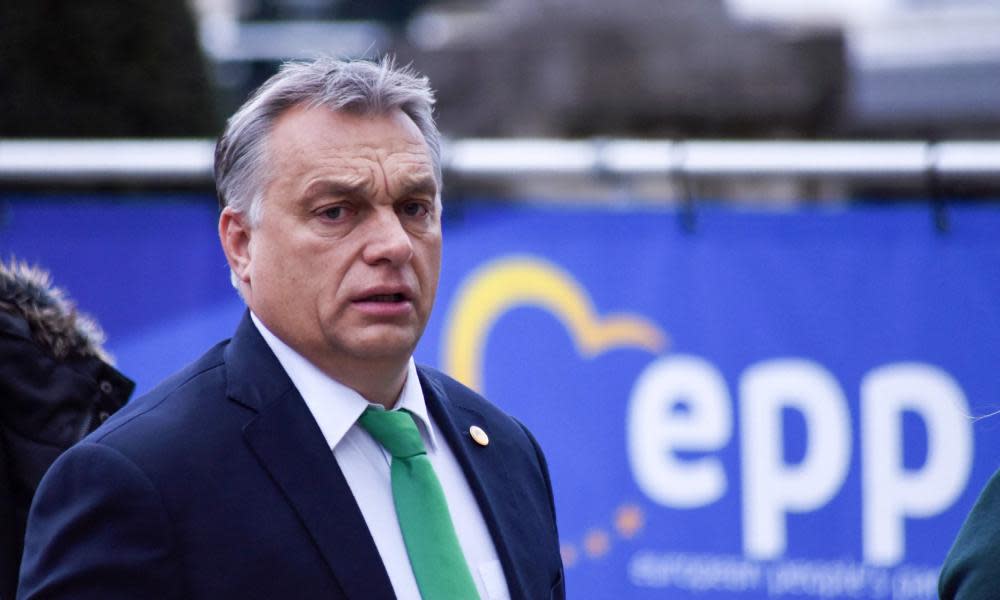Hungary's Fidesz party to leave European parliament centre-right group

Hungary’s ruling rightwing Fidesz party has said it will leave the main centre-right political grouping in the European parliament after the European People’s party (EPP) voted to change its internal laws on excluding members.
The EPP’s 180 members, many of whom have campaigned for the expulsion of Fidesz, which they accuse of weakening Hungary’s democracy and curbing media and other freedoms, voted by 148 to 28 in favour of the new rules, with four abstentions.
The party’s chairman, Hungary’s prime minister, Viktor Orbán, said in a letter posted on Twitter that it was “disappointing” that in the middle of a pandemic the EPP was curtailing the rights of its own representatives.
Orbàn accused the EPP of “trying to mute and disable our democratically elected MEPs” and called the vote “a hostile move against Fidesz and our voters”, as well as “anti-democratic, unjust and unacceptable”.
A spokesman for the EPP Group, Pedro Lopez de Pablo, said the Hungarian prime minister’s response to the vote was was “his own personal decision” and that the group would not comment.
Dacian Ciolos, president of the centrist Renew Europe Group in the parliament, welcomed what he described as the “long overdue departure of Fidesz and Viktor Orbán from mainstream European politics”.
Under Orbàn, Fidesz had “eroded democracy in Hungary and vandalised European values”, Ciolos said. “It is regrettable that the EPP have harboured the slide to authoritarianism in Hungary for so long. There is no space for the toxic populism of Fidesz in European politics.”
Orbán’s decision to walk away from the biggest single voting bloc in the parliament ends years of wrangling between EPP parties over whether or not to kick his rightwing, populist party out of the group or keep its MEPs onboard.
In a letter to the EPP’s leader, Manfred Weber, on Sunday, Orbán had threatened to leave the group if the vote – on a proposal to allow the group to penalise an entire member party, rather than just a single MEP – passed.
The new rules, which would allow for suspended member parties to be expelled with a simple majority, were “tailor-made to punish Fidesz”, Orbán wrote. “The message is clear and duly noted. If Fidesz is not welcome, we do not feel compelled to stay.”
The EPP suspended Fidesz’s membership in 2019 over growing concerns that the rule of law was being eroded in Hungary and that the party was engaging in anti-Brussels rhetoric and attacking the EPP leadership. The party currently has 12 MEPs.
A Hungarian government poster campaign in 2019 accused the then European commission head, Jean-Claude Juncker, and the liberal US billionaire George Soros – Orbán’s bête noire – of plotting to flood Europe with migrants.
The EPP subsequently sent a delegation to produce an internal report assessing the future membership of Fidesz – a move that drew a highly critical response from Orbán who said the party would make its own decision on its future.
More recently, the EPP suspended Tamás Deutsch, the head of the Fidesz delegation in the European parliament, stripping him of his rights to speaking time in plenary sessions and removing him from his positions in the group, after he compared Weber to the Gestapo and Hungary’s communist-era secret police.
Many of the more moderate national delegations in the EPP, which welcomed Orbán’s party in the early 2000s, have pushed for the party to be expelled, arguing that it no longer represents the group’s values.
National delegations from Scandinavia, Austria, Belgium and the Netherlands have long campaigned for Orbán’s exclusion, while the Christian Democrat CDU/CSU of Germany’s chancellor, Angela Merkel, has consistently been more reluctant.
Orbán’s decision to take Fidesz out of his own volition in the end represents a welcome resolution to the problem for the EPP, as tensions with Hungary and Poland over the rule of law are likely to ramp up further in the coming months.
Orbán has reportedly already begun exploring European parliament alliances with parties to the right of the EPP that are more closely in line with his nation-first, anti-immigration policies.
Fidesz’s MEPs are now likely to join either the socially conservative and Eurosceptic European Conservatives & Reformists (ECR) group dominated by Poland’s Law & Justice (PiS) party, or the far-right, nationalist Identity & Democracy group founded in 2019 by France’s Marine Le Pen and Italy’s Matteo Salvini.

 Yahoo News
Yahoo News 
